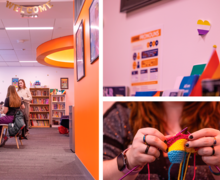Campus mourns loss of ‘caring’ anthropology professor
Robert McClure, a professor in the Maxwell School of Citizenship and Public Affairs, was at the home of Michael Freedman twice last week. McClure’s last visit was on Thursday night, when his friend had slipped into a coma. His colleague of 40 years died shortly after.
Freedman, 68, was an associate professor of anthropology who was diagnosed with lung cancer last December, colleagues said. Freedman and McClure used to teach a class together in Maxwell. McClure said Freedman was always a persistent advocate for his students.
‘Anytime we would stray from the fundamentals, he would always bring us back,’ McClure said. ‘He would say, ‘What’s the point?’ or ‘What about the students?’ He was always about the students. He was blunt. He was beautifully blunt.’
Freedman received his doctorate from the University of Michigan in 1967, just before he came to SU to begin teaching for more than four decades.
McClure has been teaching one of Freedman’s classes since Freedman had to leave the university four weeks ago. When students heard of his death, they told him they never encountered someone as provocative and thoughtful as Freedman.
‘He was a guide to their thinking,’ McClure said. ‘That he could tease out of them ideas they never knew they had, that’s the mark of a great teacher.’
McClure paused for a moment and smiled in sad recollection.
‘He was a good man,’ he said.
For fellow anthropology professor Susan Wadley, her colleague’s death didn’t become real to her until she had to teach a class. She knew Freedman had been ill for a year and upon hearing of his death, she said she felt naturally sad.
‘It wasn’t until I got up to teach a class afterwards,’ Wadley said. ‘I was trying not to cry while I was teaching.’
Wadley said Freedman was full of life and energy.
‘He was always willing to put his heart into whatever he was doing,’ she said. ‘He wanted you to do everything as well as you possibly could, and his graduate students that wanted to meet that challenge really appreciated him.’
Justin Worst, a junior anthropology and history major who had Freedman for three classes during the last two years, said he knew Freedman had been sick, but he was shocked to hear of his professor’s death. He said Freedman’s entertaining sense of humor is what always stood out to him.
‘Somehow, in all three classes I took with him, there would always be one day where he would randomly start speaking in Swahili,’ Worst said. ‘His was the first class I ever took at Syracuse, and I really looked forward to every day that I had him.’
Before Freedman died, he received a letter from a former teaching assistant of his. The letter – read to Freedman shortly before he died – told of his role in his assistant’s life and many others.
Svetlana Peshkova, a visiting assistant professor of religion and the teaching assistant who wrote the letter, said she choked up when she first heard of his death.
‘He was my professor, he was my mentor, he was a friend,’ Peshkova said. ‘He helped me in a number of ways, whether it be learning how to be a better teacher or learning to be a better human being.’
Freedman helped Peshkova with her dissertation while she worked under him.
‘We talked about life and families and work, about teaching anthropology. We talked about his dog,’ she said with a laugh.
Peshkova said Freedman loved his dog. Freedman had a beagle named Charlie and a big Doberman named Jessie. Wadley and fellow anthropology professors recalled them coming to school with Freedman every day, until one passed away. Freedman continued to bring his remaining dog with him, though. Wadley said the dog was always by his side, even at the office.
‘He was a very caring individual,’ Peshkova said. ‘There are people who can be professors, then there are people who can be mentors. He was a mentor. There are people who can be disciples. He taught us all kinds of stuff, all kinds of wisdom, about life and politics and love.’
‘It’s really hard for me to talk about,’ she said, barely getting her words out. ‘We lost a human being, a wonderful human being. That’s all I can say.’
Published on November 17, 2008 at 12:00 pm





